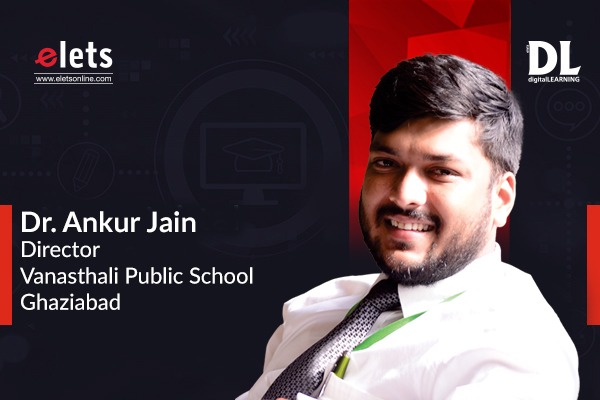
Augmented Reality, Virtual Reality and the Internet of things are still not a part of mainstream education, despite massive strides in the field nonetheless shared Dr. Ankur Jain, Director, Vanasthali Public School, Ghaziabad in an exclusive conversation with Sheeba Chauhan of Elets News Network. Edited excerpts:
Equitable access to learning opportunities and improved skills development in primary education ensures a better future. Do you think catering to primary education mindfully can transform the education ecosystem?
Our world today is making history every minute, every hour and every day. It will change many things for us, equity in education being one of them. For many years now our education system has been trying hard to ensure equitable access to every child in the school.
It is very important to ensure that primary education is inclusive of every child particularly the most marginalised, including those with different kinds of disabilities or even if they belong to a minority group.
It can transform the education system completely because in order to ensure equity education the school must improve the measurement of learning outcomes. Teachers must be trained to deliver inclusive education and the schools can also improve the quality of the learning environment. Initially catering to primary education only can initiate big change at the later levels.
If we take care of small things, big things automatically fall into the right place.
244 million children and youth are out of school globally, of which 118.5 million are girls. Apart from the several other concern, this is the major concern seen in school-going students. Your comments on the same.
The major cause of the declining number of educated women is the lack of proper infrastructure and facilities for women. The increase in female literacy rate was 3.15% more as compared to the male literacy rate as per the census of 2011. The girls at an early age are engaged in domestic chores. As many parts of our country still have gender bias i.e., either due to social discrimination or economic exploitation. This is also one of the causes of the low retention rate and high dropout of female child unless part of the country still people believe in the system of early marriage. A complete reformation of the education system is required to bring alarming changes to accelerate the graph of girl education.
World Education Summit 2023 in Dubai aims to unlock fresh strategies and foster new approaches to build a future-ready education ecosystem. How do you think such conferences help to uplift education standards at a global level?
A learning ecosystem is a system of people, content, technology, culture, and strategy, existing both within and outside of an organization, all of which have an impact on both the formal and informal learning that goes on in that organization.
Waves of technological innovations geared towards accessibility, convenience and engagement are driving important everyday choices for students that translate to how they absorb new information and integrate it with existing repertoire.
Augmented Reality, Virtual Reality and the Internet of things are still not a part of mainstream education, despite massive strides in the field nonetheless.
Conferences held at the global level will surely uplift the education system because such Conferences held at a global level are an exciting biennial gathering of experts in the scientific, technical, and socio-economic dimensions of restoring damaged and degraded ecosystems. In fact, conference attendees are passionate about discussing and debating big-picture issues and broad trends, as well as specific tools, techniques, research, and policies for restoration.
“The age of all things connected: the age of instant generation.”
What is your take on international collaborations for early childhood education?
International student collaboration at an early age helps to promote and revitalise local communities. It is a turning point for the student as it increases interaction between two universities and leads to the improvement in the quality of children.
Children get exposure and opportunities to group problems from multiple perspectives. It also promotes Science and technology development and helps to create global leaders the primary stage of collaboration provides evidence through advocacy and communication on enhancement.
According to UNICEF, over 600 million children and adolescents worldwide are unable to attain minimum proficiency levels in reading and mathematics. What do you consider the issue in developing foundational skills in literacy and numeracy?
Many researchers have proved that the main barrier to understanding mathematics relates to language and the inability to visualise the world problems due to lack of vocabulary leads to an inability to solve the problems. People who have difficulty in sounding out written word struggle to match letters to their proper sounds and will also struggle in comprehending the content of mathematics too. Reading in issues also affects students understanding of symbols and similar words.
A lot of intricate detail and in-depth knowledge is required to relate literacy and numeracy in order to deliver effective education.






















